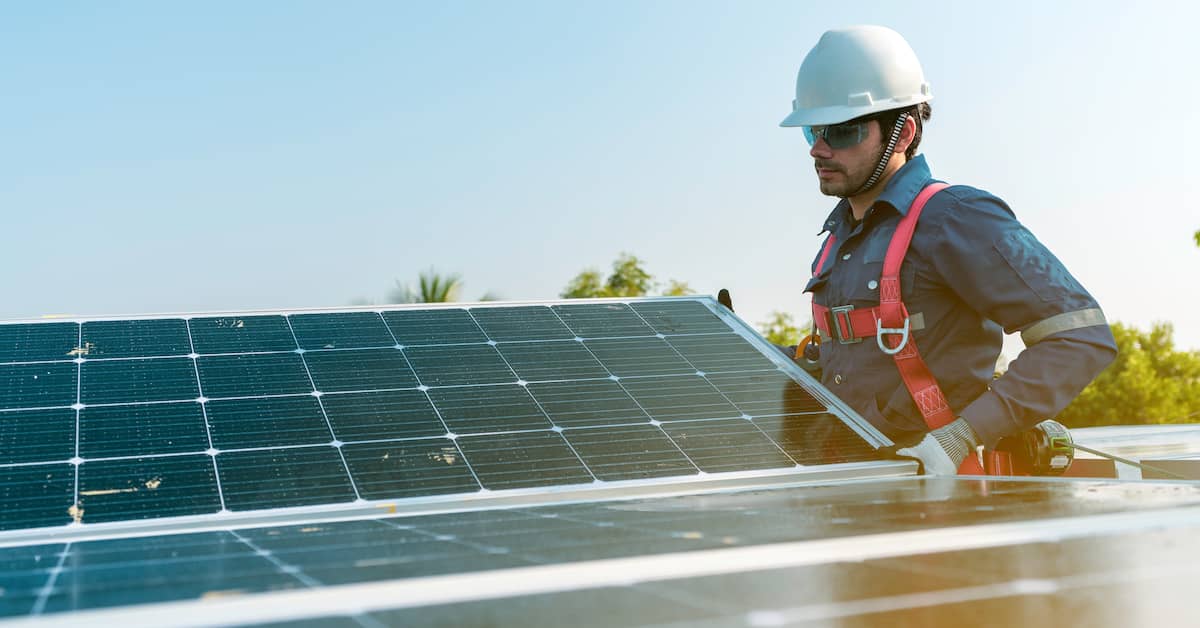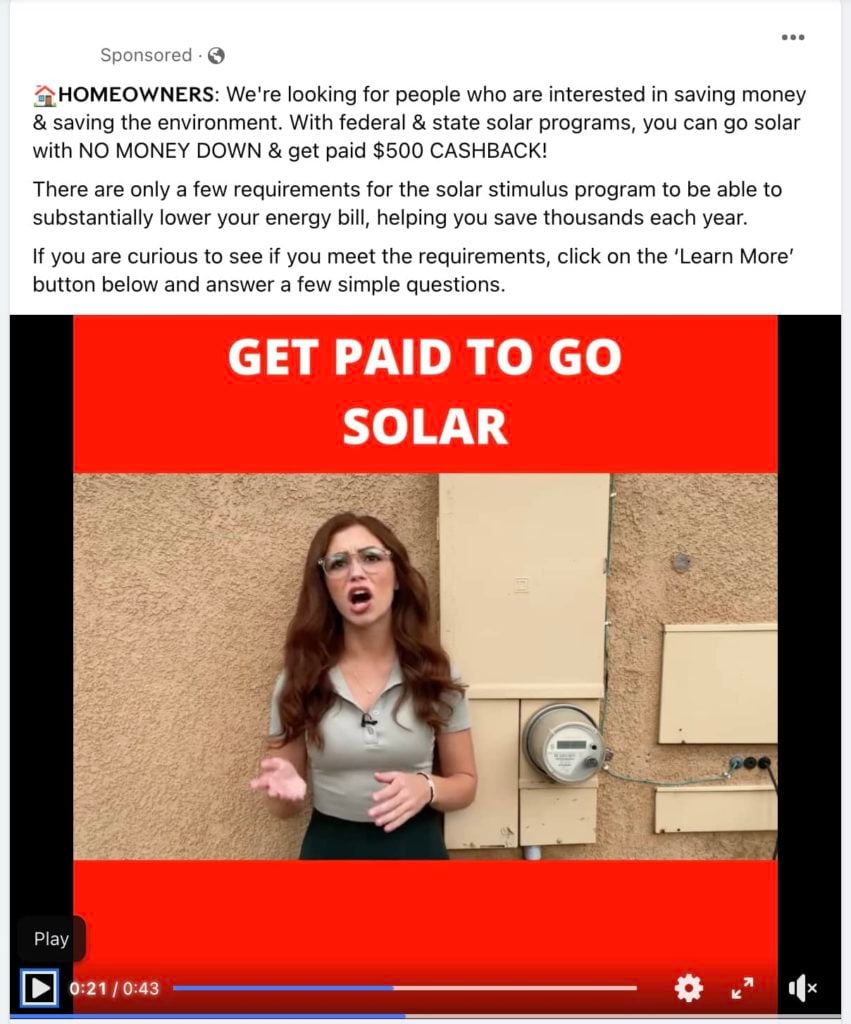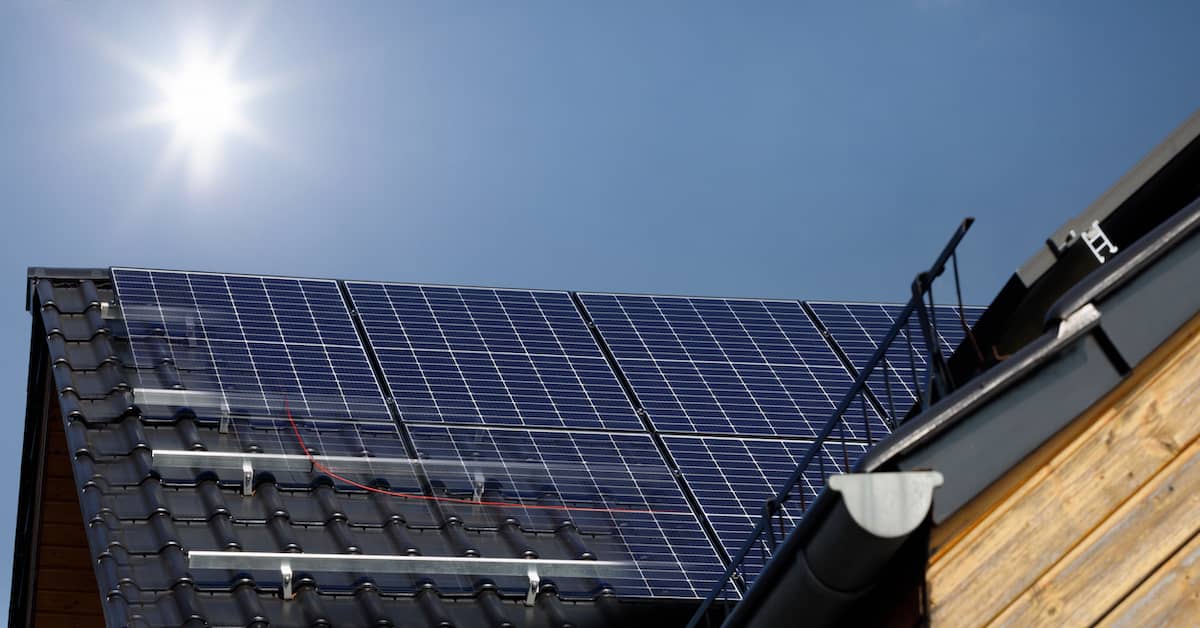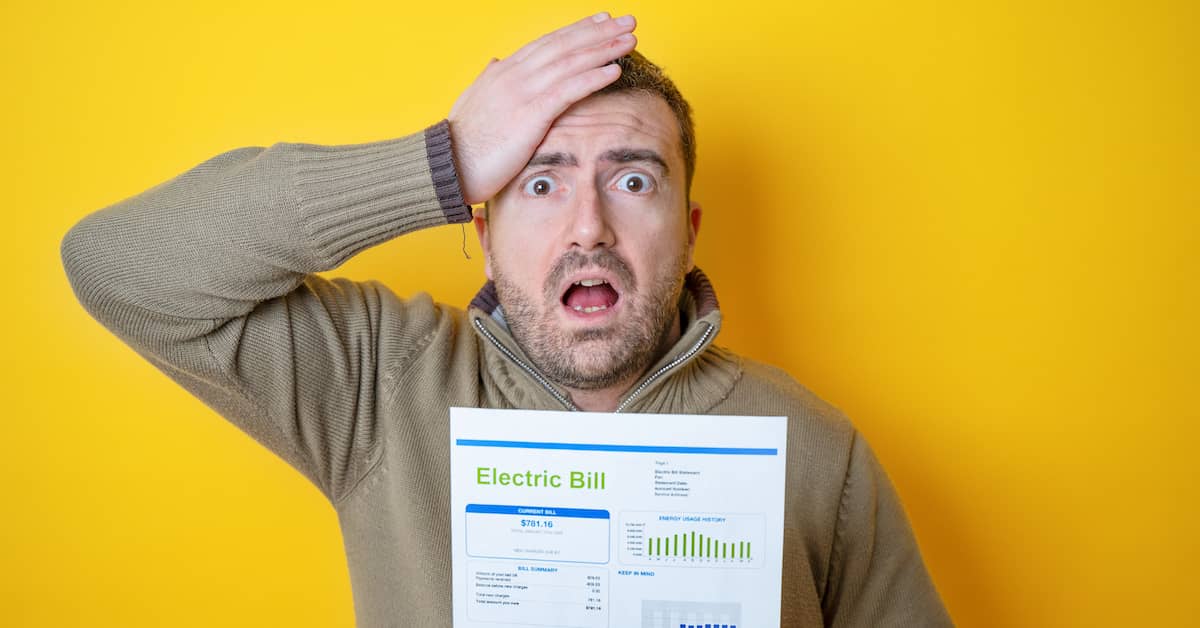
What’s with All These Ads for ‘Free Solar Panels’?
If you’ve recently searched for solar panels, a solar company, or any other terms related to solar, you’ve likely started to see a lot of ads for solar energy. From the websites you visit to your social media feed to videos, ads for solar panels may seem inescapable.
For the most part, the ads you’re seeing are probably for local solar installation pros in your area. If you’re thinking about going solar, these ads could actually be beneficial; they can point you to the right contractor or company.
However, you might have also seen some questionable ads on social media and/or as part of the ad roll on YouTube videos.

The language in the ads varies, but most talk vaguely about changes in government policy or stimulus programs that make it possible for homeowners to get “free solar panels.”
Let’s be clear: The ads for “free” solar panels are false advertising. Although not a scam per se, these ads are misleading and should be treated with the utmost skepticism.
What Do the Ads Mean by ‘Free’ Solar Panels?
How much will solar panels cost is one of the major questions anyone asks when they are thinking about going solar. Determining whether or not solar fits your budget is important, and it is certainly worth devoting time and effort to getting an honest answer.
The free solar ads seek to capitalize on this common question among homeowners. Everyone loves free, especially when the product in question is a significant investment.
What these ads don’t tell you is that instead of buying solar panels upfront, you are entering into an agreement to pay the installer over time. This arrangement can take one of two different forms:
- A solar lease: The homeowner pays monthly installments for the right to use the company’s solar panels and other equipment. You don’t own the solar panels yourself, which reduces the value solar panels add to your home.
- A solar power purchase agreement: Also called solar PPAs, the homeowner pays the installer monthly for the electricity generated by the solar panel system at a fixed price.
The ads say the solar panels are “free” because there is no out of pocket cost on the equipment. However, once the system is activated and starts producing energy, the customer does have to pay the installment on the lease or make a PPA payment every month.
Why Are the Offers for ‘Free’ Solar Panels Bad?
Ultimately, the ads for “free” solar panels are bad because they are dishonest. One solar energy expert even called them “predatory and harmful.”
Many of the ads reference a “new solar stimulus program” supposedly enacted by the federal government. No program like this exists. Although the solar Investment Tax Credit has been in place for over 15 years, the federal government has never just given away solar panels.
Other ads claim that the government or local utilities will “pay” homeowners to install solar panels. This is not true, either. Although electric companies in Colorado and other parts of the country commonly offer incentives to homeowners who go solar, the solar energy systems must meet certain requirements to qualify. The ads make no mention of these requirements, nor do they indicate that their equipment is in compliance with the standards used by local utilities.
Finally, the “free” solar panel ads also bury the fine print when it comes to the obligations customers are under after they enter into contracts with the solar companies running these ads. Solar leases and solar PPAs generally include price escalator clauses that can increase what you pay for solar with little to no warning.
(Compare this to homeowners who own their solar panels. In this scenario, you only pay for electricity if you are (a) connected to the grid and (b) consume more power than your solar energy system generates.)
Furthermore, solar PPAs and solar leases both involve entering long-term contracts with the seller. This can create problems if you need to sell your home; your options include trying to get new buyers to take over the lease or agreement as part of the sale, breaking the lease or PPA and paying a penalty, or paying off the rest of the term and buying the solar panels yourself (which may not be an option for everyone).
Don’t Fall for False Solar Advertising
Trust matters when you choose a residential solar company. You need to know that the installer will deal fairly with you, and that starts with truth in advertising.
If you see a solar energy company making outrageous claims in their advertisements, the company might take a similarly dishonest approach to dealing with you in person. The decision to go solar is big, and you don’t want to let exaggerations and outright lies influence your choice.
You need to know what you can expect to pay to install solar panels. Pricing on the system should be transparent, and the solar company should be able to walk you through the pros and cons of various pricing models (e.g., buying the equipment upfront vs. a solar loan or financing).
In addition, you need to know that the contractor or company is reputable. Solar companies that have been in business for years and have offices in the communities they serve are generally much more reliable than the companies behind the dubious “free solar panel” ads.
Contact a Solar Energy Company Today
REenergizeCO was born and raised in Colorado. Our company is built on years of outstanding service and thousands of solar panel installations throughout the Front Range.
We don’t believe in gimmicky advertising or stretching the truth to make a sale. Instead, we focus on your individual needs for solar energy solutions.
REenergizeCO has offices in Denver and Fort Collins.
For service in Denver, please call (303) 227-1000 today.
If you live in or around Fort Collins, please call (970) 323-3191.
"*" indicates required fields


